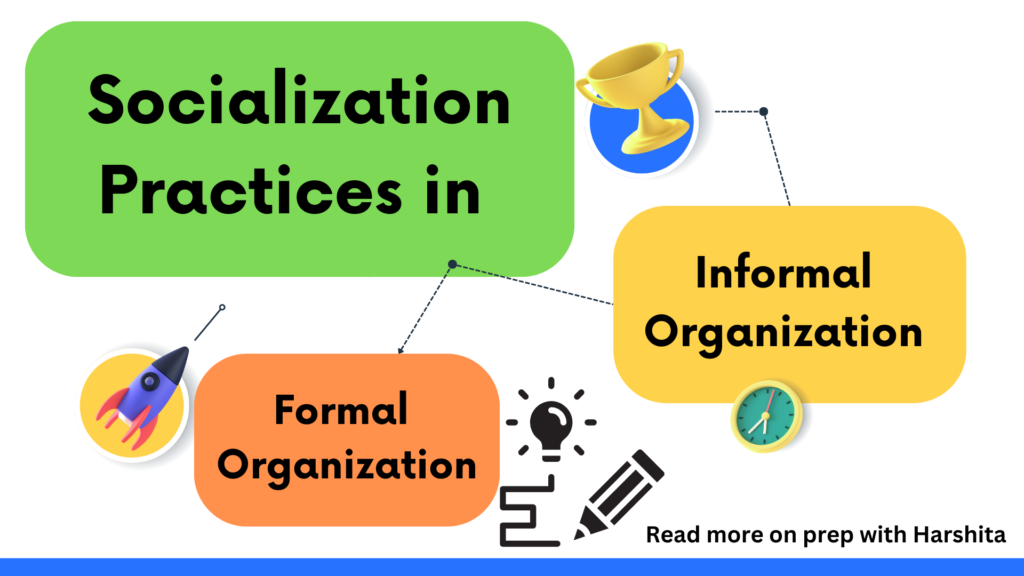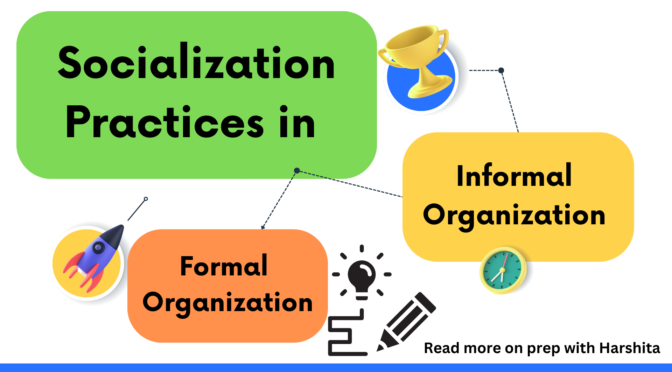The socialization practices in formal and informal organization refers to how individuals acquire the knowledge, skills, values, and behaviors necessary to integrate into and function effectively within these organizational contexts.
Here is a detailed explanation of the socialization process in formal and informal organizations:
Formal Organizations:
- Orientation Programs: When individuals join formal organizations, they typically go through orientation programs. These programs introduce them to the organization’s mission, values, policies, and procedures. They provide an overview of the organizational structure, roles, and expectations, helping new members understand their place within the organization.
- Training and Development: Formal organizations invest in training and development programs to socialize employees into their roles and build necessary skills. These programs can be formal (e.g., workshops, seminars) or informal (e.g., on-the-job training, mentoring). Through training, individuals learn about organizational practices, technical skills, communication protocols, and the organization’s culture.
- Role Modeling: Existing employees serve as role models for newcomers in formal organizations. New members observe and learn from their experienced colleagues, understanding how tasks are performed, how decisions are made, and how to navigate the organizational hierarchy. Role modeling helps new members assimilate into the organization and learn implicit norms and practices.
- Organizational Culture: Formal organizations have their own unique cultures, encompassing shared values, beliefs, and behavioral norms. New members gradually internalize the organization’s culture through daily interactions, observing how others behave, and adapting their behavior to align with the prevailing norms and expectations.
- Performance Feedback and Evaluation: Formal organizations provide regular performance feedback and evaluations to employees. This feedback helps individuals understand how their behavior aligns with organizational expectations, goals, and standards. It contributes to their ongoing socialization, allowing them to adjust their actions and performance to meet organizational requirements.
Informal Organizations:
- Observation and Participation: In informal organizations, newcomers observe and participate in ongoing activities. They learn through active engagement, observing how others interact, collaborate, and make decisions. By participating in informal networks and groups, individuals acquire tacit knowledge, unwritten rules, and social dynamics that drive the organization.
- Informal Mentoring: Informal organizations often rely on informal mentoring relationships. Newcomers are paired with experienced members who guide, support, and share their knowledge and experiences. These informal mentors help newcomers navigate the organization, understand cultural nuances, and develop a sense of belonging.
- Informal Networks and Social Circles: Informal organizations thrive on social networks and social circles. Through interactions with peers and colleagues, individuals learn about the organization’s values, practices, and unwritten rules. They build relationships, establish social bonds, and gain access to informal channels of information and influence.
- Collective Learning: Informal organizations encourage collective learning and knowledge sharing. Employees participate in informal discussions, brainstorming sessions, and informal problem-solving groups. This collaborative learning fosters a sense of community, shared understanding, and collective responsibility within the organization.
- Adaptation to Change: Informal organizations often require individuals to be adaptable and flexible. As the nature of informal organizations is often fluid and dynamic, newcomers quickly learn to adjust to changing circumstances, shifting priorities, and evolving roles. Adaptability becomes an essential skill for effective socialization in these contexts.
Also Read : Family as social Institution

Also Visit : Prep with Harshita


The articles you write help me a lot and I like the topic http://www.hairstylesvip.com
Vibracion del motor
Equipos de ajuste: fundamental para el operacion estable y eficiente de las maquinarias.
En el entorno de la ciencia contemporanea, donde la eficiencia y la fiabilidad del equipo son de gran relevancia, los aparatos de balanceo tienen un papel crucial. Estos equipos dedicados estan creados para equilibrar y asegurar componentes moviles, ya sea en equipamiento manufacturera, automoviles de traslado o incluso en aparatos de uso diario.
Para los expertos en reparacion de sistemas y los ingenieros, utilizar con aparatos de ajuste es crucial para asegurar el funcionamiento fluido y fiable de cualquier aparato dinamico. Gracias a estas soluciones innovadoras avanzadas, es posible reducir considerablemente las movimientos, el sonido y la carga sobre los cojinetes, aumentando la longevidad de elementos caros.
De igual manera significativo es el rol que tienen los equipos de balanceo en la asistencia al consumidor. El soporte experto y el soporte regular usando estos sistemas permiten brindar prestaciones de optima excelencia, mejorando la contento de los compradores.
Para los responsables de emprendimientos, la contribucion en sistemas de equilibrado y dispositivos puede ser importante para mejorar la eficiencia y productividad de sus sistemas. Esto es principalmente relevante para los inversores que dirigen pequenas y intermedias empresas, donde cada aspecto importa.
Tambien, los equipos de balanceo tienen una gran utilizacion en el sector de la proteccion y el control de excelencia. Habilitan identificar probables problemas, evitando mantenimientos costosas y averias a los sistemas. Incluso, los indicadores recopilados de estos dispositivos pueden usarse para perfeccionar procesos y aumentar la exposicion en buscadores de busqueda.
Las campos de uso de los aparatos de balanceo cubren multiples sectores, desde la produccion de transporte personal hasta el supervision ambiental. No afecta si se considera de importantes elaboraciones industriales o pequenos establecimientos caseros, los dispositivos de ajuste son necesarios para proteger un desempeno efectivo y sin paradas.
Attractive part of content. I just stumbled upon your website and in accession capital to assert that I get actually loved account your blog posts. Anyway I’ll be subscribing for your augment and even I achievement you get entry to constantly rapidly.
Great post. I was checking continuously this blog and I’m impressed! Very useful info specifically the last part 🙂 I care for such info a lot. I was looking for this certain information for a very long time. Thank you and best of luck.
Hi there very cool blog!! Man .. Beautiful .. Wonderful .. I’ll bookmark your website and take the feeds also?KI am glad to find so many helpful information here in the put up, we want develop extra techniques in this regard, thank you for sharing. . . . . .
I appreciate, cause I found exactly what I was looking for. You have ended my 4 day long hunt! God Bless you man. Have a nice day. Bye
hey there and thank you in your info – I’ve definitely picked up something new from right here. I did however expertise a few technical points using this website, since I experienced to reload the website lots of occasions prior to I could get it to load properly. I had been considering in case your web host is OK? Not that I am complaining, however slow loading circumstances instances will sometimes impact your placement in google and could damage your high quality rating if advertising and ***********|advertising|advertising|advertising and *********** with Adwords. Well I’m adding this RSS to my email and can glance out for much more of your respective interesting content. Ensure that you update this once more very soon..
[b]Eliminate Vibration Issues and Improve Equipment Performance[/b]
Vibration is a silent killer of industrial machines. Imbalance leads to worn-out bearings, misalignment, and costly breakdowns. [b]Balanset-1A[/b] is the ultimate tool for detecting and correcting vibration problems in electric motors, pumps, and turbines.
[b]What Makes Balanset-1A Stand Out?[/b]
– Precise vibration measurement & balancing
– Compact, lightweight, and easy to use
– Two kit options:
[url=https://www.amazon.es/dp/B0DCT5CCKT]Full Kit on Amazon[/url] – Advanced sensors & accessories, Software for real-time data analysis, Hard carrying case
Price: [b]2250 EUR[/b]
[url=https://www.amazon.es/dp/B0DCT5CCKT][img]https://i.postimg.cc/SXSZy3PV/4.jpg[/img][/url]
[url=https://www.amazon.es/dp/B0DCT4P7JR]OEM Kit on Amazon[/url] – Includes core balancing components, Same high-quality device
Price: [b]1978 EUR[/b]
[url=https://www.amazon.es/dp/B0DCT4P7JR][img]https://i.postimg.cc/cvM9G0Fr/2.jpg[/img][/url]
Prevent unexpected breakdowns – Invest in [b]Balanset-1A[/b] today!